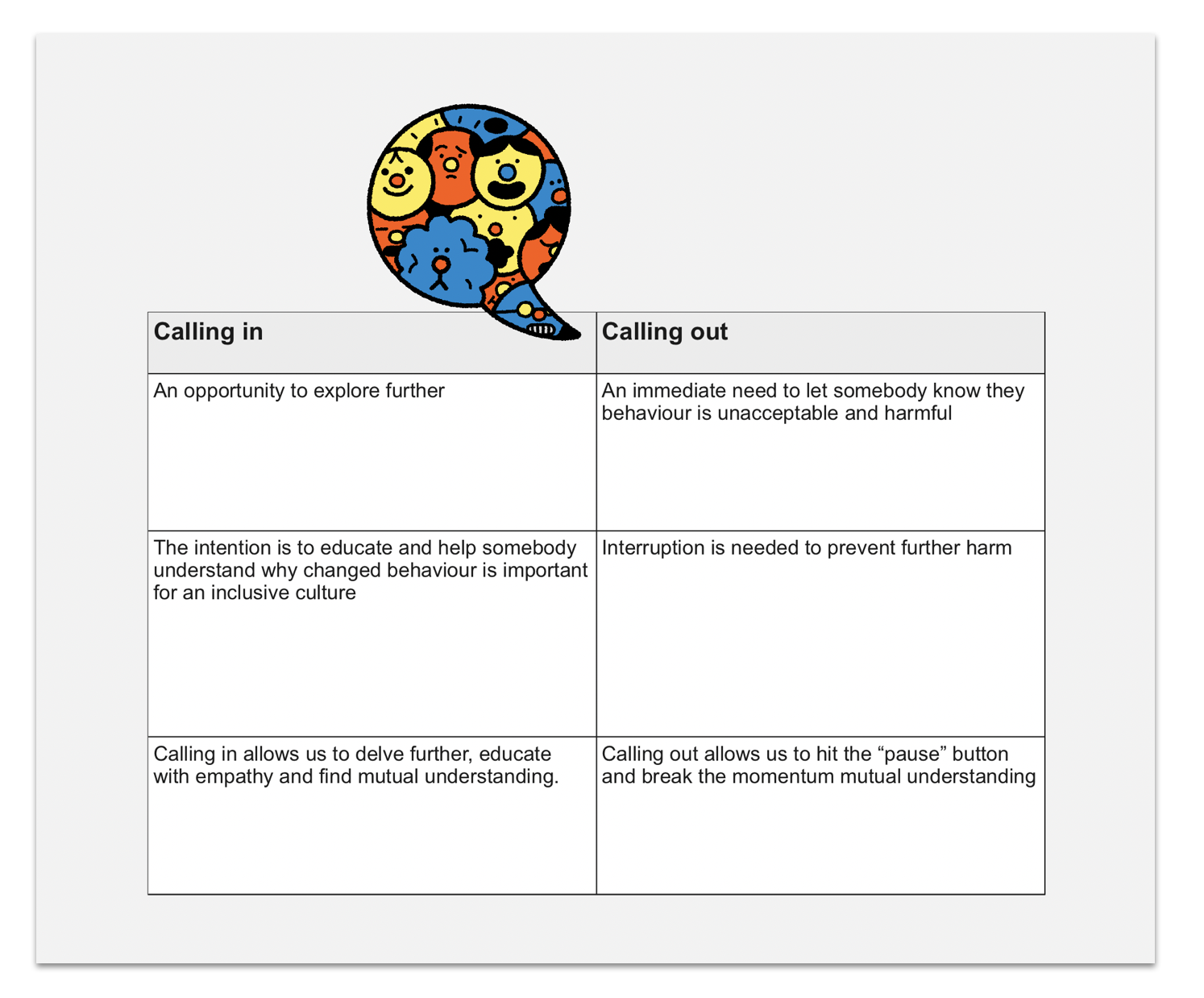In Conversation with Abi Adamson: Calling in, calling out and using our privilege positively.
Abi Adamson - DE&I expert, founder of The Diversity Partnership, and coach and facilitator for our Privilege, Microaggressions and Allyship workshops - shares her perspective on opening in-office dialogues, being an inclusive leader, and the impact of important conversations beyond work hours.
What motivated you to launch The Diversity Partnership?
I came from a traditional HR background with a focus on talent acquisition and helping organisations hire as inclusively and as diversely as possible. However, that just wasn't happening. I was still seeing abuses of privilege and power, widespread bias and prejudice, and covert microaggressions from the top to the bottom of business.
Around 2019 I was working at a company as the head of talent and acquisition, but as a side job I was writing think-pieces on diversity in the workplace and doing a lot of DE&I work for other organisations. Then the penny dropped. I loved what I was doing, so how about I do it full time? So I stopped working for people who I didn’t feel valued me, and became my own boss.
The Diversity Partnership had been in the works for a while, but it went live in June 2020, right in the height of the pandemic and, sadly, one month after the death of George Floyd.
The ‘partnership’ part of the name is incredibly important to me. I didn't want people with very powerful titles to just think I'm gonna rock up and do the hard work for them. I can't come into an organisation, sprinkle fairy dust and magic away the problems they face on my own. They need to meet me halfway. This is a partnership.
In your workshops with YCN, you talk about ‘Calling In,’ and ‘Calling Out,’ as two different responses to microaggressions — subtle discriminatory behaviours. What’s the difference between calling someone in, and calling them out?
Calling in is the nicer way. You're giving someone the opportunity to explore why they said what they said, or why they did what they did. The intention is to help people understand that what they said has landed upside down.
The importance of calling someone in is giving someone the space and the grace to be able to make those mistakes, but, once they have been called in, to give them the chance to do better. Really it's about helping to match someone’s behaviour with their intention.
Calling out is an immediate ‘step in’ to let someone know that they are causing you, another person or a group of people harm. It’s when you need to immediately interrupt someone to prevent further trauma, and also to let them know that the discriminatory or prejudicial behaviours that they're exhibiting don't align with your values, and you as a business will not accept that kind of behaviour.

"The ‘partnership’ part of the name is incredibly important to me.... I can't come into an organisation, sprinkle fairy dust and magic away the problems they face on my own. They need to meet me halfway. This is a partnership."
What about preventative measures? Calling someone or calling them out is a great first step towards correcting harmful behaviour, but what do leaders need to do to stop these behaviours happening in the first place?
The first thing we need to aim for is collective awareness through training. Before we go into unconscious bias, privilege awareness or inclusive language, we need an awareness of how they show up, and the effect they have in the workplace. One of my favourite things to say is ‘nobody knows everything, but together we know a lot.’
Everyone has built in biases, and harmful behaviours show up in every workplace, but building that awareness and doing that training leads to greater understanding, so when these bad behaviours do start creeping into the workplace everybody can check one another. The ability to understand what these things mean and how they show up is the best preventative measure.
When companies open dialogues about microaggressions and the impact of privilege, what effect does it have? It has a huge positive impact on the culture of course, but are there other less obvious benefits? (other than it just being the right thing to do).
It makes a massive difference. It's one of the greatest parts of my job; watching people have those a-ha! moments when they understand that, for example, touching a Black person or person of colour's hair or asking ‘Where are you really from?’ is a microaggression. People just stop and say ‘Oh my gosh, I have definitely said that 100 million times before. I had no idea!’
I see people go into a session believing they have to step on eggshells, and leaving determined to do better. It really makes me love what I do; creating that awareness and positive drive.
And conversations around privilege and microaggressions go beyond work. Ultimately the reason why they’re funnelled into the workplace is because of how widespread they are in British society. We don't know what we don't know, but the moment we know we're supposed to do better, especially if it's causing someone harm, we do. We spread the word to our colleagues, to our children, to our friends.
How can a leader open a dialogue about privilege in their company? What pitfalls should be avoided?
It often goes wrong when people in powerful positions get defensive about their privilege. I sat through a session where a man said ‘I don't need anyone making me feel guilty for getting where I am today. I got here on merit.’ Well, yes, you may have gotten here on merit, but you've also changed the narrative.
If you are a white man in a leadership position who went to private school, you may very well have worked hard to get where you are. But you've also had the right connections to get you to the right places, and you're going to have a very different outlook on life to a Black woman from a working class family who didn't go to private school and couldn't afford to do unpaid work experience.
A better way is to have someone with that lived experience open that dialogue for the company. It's very important that you get the right people to talk on specific topics. Make sure that you're not taking up space by speaking about a topic that you don't understand.
"One of my favourite things to say is ‘nobody knows everything, but together we know a lot.’"
How can employees and leaders ensure that awareness of privilege is channelled into genuine change?
When it comes to leaders, it's ultimately about self-awareness and using their privilege positively to do better for other people.
If you’re a leader or manager from a privileged background, you should know no one is blaming you for being privileged. But you should recognise your privilege, and use it to build equitable practices for everybody else.
Take a look at your hiring process. Do you only accept applicants from Russell Group, Oxbridge or Ivy League universities? Strike that off if you do.
Do you only offer unpaid internships? That means that you are othering so many people that don't have the means to do unpaid work.
It's all about using your privilege for positive action, wherever you are in the business.
What is the best thing that leaders can do to create a healthier, more inclusive culture?
Building an environment where people can bring their authentic selves to work. There’s nothing more draining and damaging to the mental health and productivity of a person than a workplace where they feel that if they don’t ‘edit’ themselves they won’t go far. I’m speaking from experience.
Are you transparent? Are you communicative or are you more secretive? All those things will separate the wheat from the chaff. If you are transparent and open and vulnerable, you will get the best out of your people.
For the very first time in decades, there are more jobs than applicants, and people will leave your business if they feel like they’re having to edit themselves, or if they feel like they're victims of microaggression. And, if no one's held accountable, they will go to another business and take all of their expertise with them. And you will be left with no good people.
However, to end on a positive note, I’d like to think the majority of us are striving to be on the right side of history when it comes to equality and making sure your organisation sets people up for success no matter their background is paramount.
What books should we be reading in 2022?
I'd recommend All About Love by bell hooks, Black, Listed by Jeffrey Boakye, Diversify by June Sarpong, This Book is Anti-Racist by Tiffany Jewell and Aurelia Durand, Women Don't Owe You Pretty by Florence Given and The Nickel Boys by Colson Whitehead.
